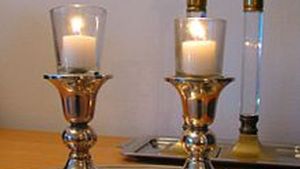Several helpful users provided handy diagrams to help the uninitiated distinguish between traditional Haredi garb and various Goth-type fashion trends.
 Jerusalem, October 30 – Leaders in the Palestinian community urged their followers today to show some religious tolerance by avoiding stabbing ultra-Orthodox Jews on the Sabbath, local sources are reporting.
Jerusalem, October 30 – Leaders in the Palestinian community urged their followers today to show some religious tolerance by avoiding stabbing ultra-Orthodox Jews on the Sabbath, local sources are reporting.
Palestinian social and broadcast media have begun featuring some moderating messages alongside the images of bloody knives and scared Jews as of this morning. While the traditional and most common image of an Israeli in such media remains the iconic figure of a black-frocked, long-sidelocked, bearded man with a black, brimmed hat, some Palestinian leaders with a presence on social media have included disclaimers to the effect that the Jews who actually resemble those images tend to regard setting foot on the Temple Mount – a flashpoint in the rhetoric surrounding the recent stabbing epidemic – as prohibited. An opinion piece earlier this week in the Haredi publication Mishpacha sought to apprise Palestinians of this datum, evidently in an attempt to deflect some of the violence from the ultra-Orthodox.
The publication retracted that article in a plea for Jewish unity, but the producers of Palestinian incitement nevertheless took the message to heart, and early Friday morning began disseminating recommendations to avoid stabbing Haredi-looking Jews between sundown Friday and nightfall Saturday, during the Jewish Sabbath. “As the brutal Zionist settler usurpers soil Al Aqsa with their filthy feet and desecrate the site with Talmudic rituals they invoke ‘religious freedom’ and ‘equality’ to justify their sacrilege,” wrote a teacher at an UNRWA school in Bethlehem. “We will not take such bait – let us show just how tolerant we are, to undermine the false arguments of the rapacious pig-dog Jews. For the sake of Al Aqsa and Palestine, stab Jews on their Sabbath only if they do not dress in black, and do not give validity to their claims.”
Other online appeals helpfully included Sabbath start and end times for various cities in Israel, obtained from online source or local Rabbinates, and still others provided handy diagrams to help the uninitiated distinguish between traditional Haredi garb and various Goth-type fashion trends. Some noted the fact that many Haredi women wear colors other than black, and that some women of non-Haredi persuasions dress almost indistinguishably from them, such that any stabbing attempts on such populations should be reserved for non-Sabbath hours.
“There is no shortage of other targets, so in the interest of religious tolerance, please refrain from stabbing Haredi-looking Jews from Friday evening to Saturday night,” said Hebron-area Fatah official Ughli Asfok. “Otherwise, attack. Only that way can we defend and liberate our land!”
“Not that I am inciting to murder or anything. As the Raïs said, Ours is a culture of peace.”




